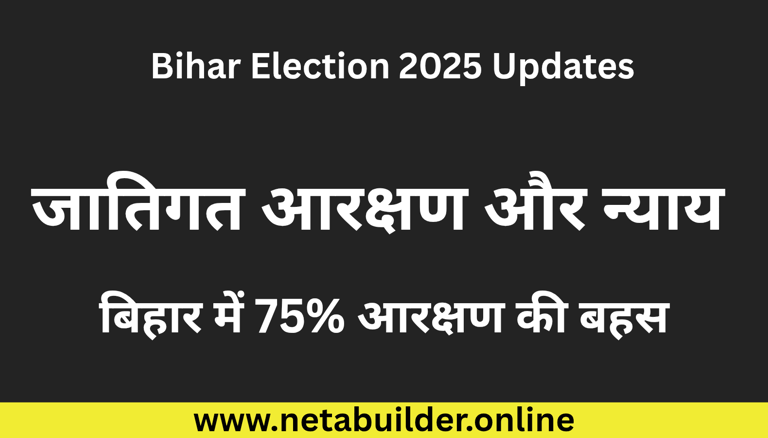Caste-based Reservation and Justice: The Debate over 75% Reservation in Bihar
The Bihar government attempted to increase the reservation to 75%, but it was rejected by the High Court. In this blog, we will discuss the social and political implications of the reservation policy and the ongoing debate over it in Bihar. *Caste-based reservation*
CEO - Kaka Enterprises Ravi S Mishra Email - ceo@kakaenterprises.in
5/18/20252 min read


जातिगत आरक्षण और न्याय: बिहार में 75% आरक्षण की बहस
बिहार सरकार ने आरक्षण को 75% तक बढ़ाने का प्रयास किया था, लेकिन इसे उच्च न्यायालय ने खारिज कर दिया। इस ब्लॉग में हम आरक्षण नीति के सामाजिक और राजनीतिक प्रभावों पर चर्चा करेंगे, और बिहार में आरक्षण को लेकर चल रही बहस को विस्तार से समझेंगे।
जातिगत आरक्षण, बिहार आरक्षण नीति, 75% आरक्षण, बिहार उच्च न्यायालय, आरक्षण बहस, सामाजिक न्याय, राजनीतिक प्रभाव, बिहार सरकार, आरक्षण का पक्ष, आरक्षण का विरोध
Bihar reservation policy, 75% reservation, Bihar High Court, reservation debate, social justice, political impact, Bihar government, support for reservation, opposition to reservation
बिहार में जातिगत आरक्षण एक महत्वपूर्ण और विवादास्पद मुद्दा बन चुका है। बिहार सरकार ने राज्य में आरक्षण को 75% तक बढ़ाने का प्रस्ताव दिया था, जिसे बाद में उच्च न्यायालय ने खारिज कर दिया। इस मुद्दे ने राज्य की राजनीति को गर्मा दिया है और समाज के विभिन्न वर्गों में इसके प्रभाव पर व्यापक बहस शुरू हो गई है।
आरक्षण नीति का इतिहास
भारत में आरक्षण नीति का इतिहास काफी पुराना है। इसका उद्देश्य समाज के पिछड़े और कमजोर वर्गों को समान अवसर देना है, ताकि वे शैक्षिक और रोजगार में अन्य वर्गों के साथ प्रतिस्पर्धा कर सकें। बिहार में भी आरक्षण का मुद्दा लंबे समय से चर्चा का विषय रहा है। राज्य में विभिन्न जातियों के लिए आरक्षण का प्रावधान किया गया है, लेकिन अब इसे और बढ़ाने की कोशिश की जा रही थी।
75% आरक्षण की प्रस्तावना
बिहार सरकार ने 75% आरक्षण की घोषणा की थी, जिसमें सरकारी नौकरियों और शिक्षा में पिछड़ी जातियों, अनुसूचित जातियों, और अन्य पिछड़े वर्गों के लिए आरक्षण को बढ़ाने की योजना बनाई थी। इस प्रस्ताव का उद्देश्य इन वर्गों को अधिक अवसर देना था, लेकिन उच्च न्यायालय ने इसे संविधान के खिलाफ करार देते हुए खारिज कर दिया।
सामाजिक और राजनीतिक प्रभाव
आरक्षण नीति का बिहार में बहुत गहरा सामाजिक और राजनीतिक प्रभाव है। जहाँ एक ओर कई लोग इसे सामाजिक न्याय के रूप में देख रहे हैं, वहीं दूसरी ओर कई लोग इसे समानता और अवसर के सिद्धांतों के खिलाफ मानते हैं। आरक्षण के विरोधी इसे कुशलतापूर्वक और योग्य व्यक्तियों के चयन में बाधा मानते हैं, जबकि समर्थक इसे वंचित वर्गों को मुख्यधारा में लाने के लिए जरूरी मानते हैं।
उच्च न्यायालय का निर्णय और उसका प्रभाव
उच्च न्यायालय ने 75% आरक्षण को खारिज करते हुए यह कहा कि यह संविधान के खिलाफ है और यह राज्य की सामाजिक और आर्थिक स्थिति को और अधिक जटिल बना सकता है। न्यायालय ने यह भी कहा कि आरक्षण को बढ़ाना संविधान के समानता के अधिकार का उल्लंघन कर सकता है। इस निर्णय ने बिहार सरकार को एक बड़ा झटका दिया और इसे राज्य में आरक्षण नीति पर पुनः विचार करने की आवश्यकता का संकेत दिया।
राजनीतिक प्रतिक्रियाएँ
बिहार सरकार और अन्य राजनीतिक दलों के बीच इस फैसले को लेकर विवाद है। कुछ राजनीतिक दल इसे अपनी राजनीति के लिए एक नया मुद्दा मानते हुए आरक्षण बढ़ाने के पक्ष में हैं, जबकि अन्य इसे विकास के रास्ते में एक बाधा मानते हैं। यह मुद्दा आगामी विधानसभा चुनावों में भी बड़ा बन सकता है, क्योंकि विभिन्न राजनीतिक दलों के लिए यह एक वोट बैंक बनाने का अवसर हो सकता है।
निष्कर्ष
जातिगत आरक्षण बिहार की राजनीति में एक महत्वपूर्ण और विवादास्पद मुद्दा बना हुआ है। 75% आरक्षण का प्रयास और उच्च न्यायालय का फैसला यह दिखाता है कि इस मुद्दे पर समाज के विभिन्न वर्गों और राजनीतिक दलों के दृष्टिकोण अलग-अलग हैं। यह देखा जाएगा कि बिहार सरकार इस मुद्दे पर आगे क्या कदम उठाती है, और इसे लेकर सामाजिक और राजनीतिक संघर्ष किस दिशा में बढ़ता है।
Caste-based Reservation and Justice: The Debate over 75% Reservation in Bihar
Caste-based reservation has become a significant and controversial issue in Bihar. The Bihar government proposed increasing the reservation to 75%, a move later rejected by the High Court. This issue has sparked intense political debate and discussions on its social implications.
History of the Reservation Policy
India’s reservation policy has deep roots in history, aimed at providing equal opportunities for backward and marginalized communities, enabling them to compete in education and employment. In Bihar, too, the reservation issue has been a subject of constant discussion. Different caste groups have been provided with reservations, but now there has been an attempt to further increase it.
The Proposal for 75% Reservation
The Bihar government announced the proposal to increase the reservation to 75%, which included enhancing the quotas for Scheduled Castes, Scheduled Tribes, and Other Backward Classes in government jobs and education. The purpose was to provide more opportunities to these groups, but the High Court declared it unconstitutional and invalid.
Social and Political Implications
The reservation policy in Bihar has a profound social and political impact. While some view it as a means of social justice, others see it as a violation of equality and merit. Those who oppose the reservation argue that it hinders the selection of qualified and capable individuals, while supporters believe it is necessary to bring marginalized communities into the mainstream.
High Court's Decision and Its Impact
The High Court rejected the 75% reservation proposal, stating that it violated the constitution and could complicate the social and economic conditions in the state. The court also remarked that such a move could undermine the fundamental right to equality. This decision was a major setback for the Bihar government and indicated the need for reconsideration of the state’s reservation policy.
Political Reactions
There is significant political disagreement regarding the High Court’s decision. Some political parties see it as an opportunity to champion social justice, while others argue that it is a barrier to development and progress. This issue could become a major talking point in the upcoming elections, as different parties may use it to appeal to their respective voter bases.
Conclusion
Caste-based reservation remains a pivotal and controversial issue in Bihar politics. The attempt to increase the reservation to 75% and the High Court’s decision shows that perspectives on this issue are deeply divided. It remains to be seen how the Bihar government will proceed with the matter and how social and political tensions surrounding this issue will unfold.
